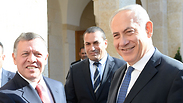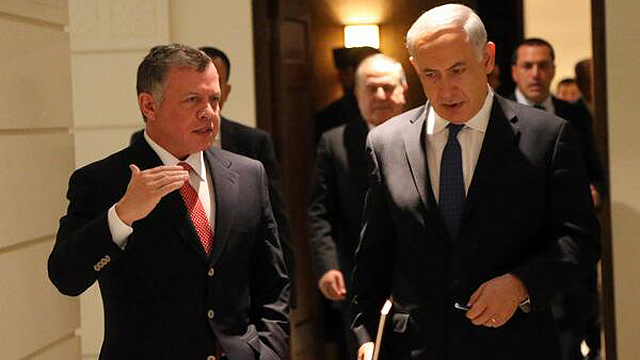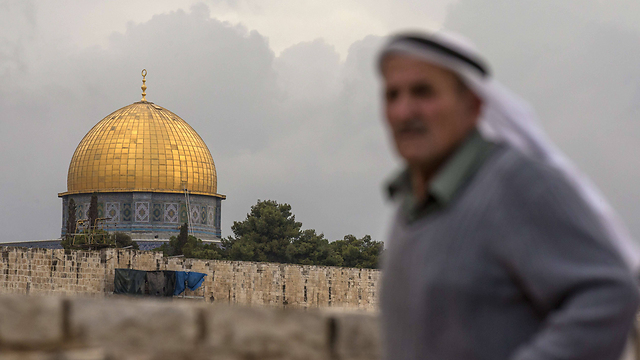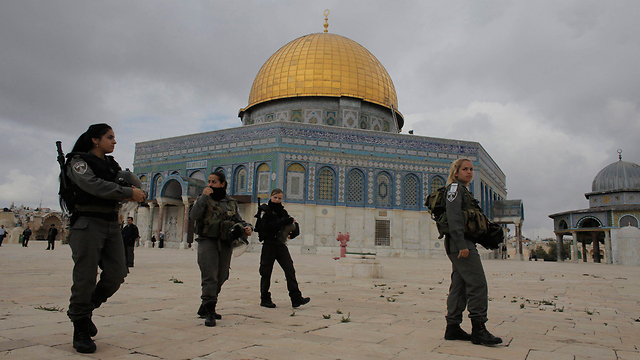
Prime Minister Benjamin Netanyahu spoke with Jordanian King Abdullah Thursday afternoon in wake of recent events on the Temple Mount and reiterated Israel's "preserve the status quo" of the al-Aqsa compound and Jordan's role in managing the holy site.
Israel says it wants stability in Jordan and is sensitive to its position in regards to the flashpoint site. Prime Minister Netanyahu's Office said that "both leaders called for an immediate end to all acts of violence and incitement."
Earlier Thursday, Jordanian sources told the Al Hayat Newspaper that the crisis that developed between the kingdom and Israel has deepened. They added that the Jordanian government perceives Jerusalem and the al-Aqsa mosque as issues related to the Kingdom's national security, and that damages inflicted to them is a "red line".
On Wednesday, Jordan recalled its ambassador to Israel in protest against what it described as "violations" in Jerusalem and its holy sites, the Jordanian state news agency reported. The decision was taken "in protest at the increasing and unprecedented Israeli escalation in the Noble Sanctuary, and the repeated Israeli violations of Jerusalem", the news agency said.
The Jordanian prime minister reportedly instructed Jordan's delegation at the United Nations to "lodge an official complaint to the Security Council", Mohammad Al-Momani, government spokesman, told Reuters by telephone Wednesday.
"Our greatest fear nowadays is that someone is trying to create disturbances on the Temple Mount in order to ignite the region, in order to harm both Jordan and Israel," Daniel Nevo, Israel's ambassador to Jordan told Israel Radio in an interview aired on Wednesday.
For Jordan, the specter of another big flare-up of the conflict between Israel and Palestinians brings risks unlike those arising from the expansion of Islamic State in Syria and Iraq. Jordan has received waves of Palestinian refugees in the 1948 and 1967 Middle East wars, and restive Palestinian nationalism has been a source of concern for decades.
Jordanian stewardship of the al-Aqsa compound was recognized in the 1994 peace treaty with Israel but dates back to 1924 when Palestinian leaders in Jerusalem granted custodianship to King Abdullah's great grandfather, Sharif Hussein.
The custodianship was reaffirmed in an agreement signed last year between the Palestinian Authority and King Abdullah. The area, which is also home to the Dome of the Rock, is known to Muslims as the Noble Sanctuary and to Jews as the Temple Mount.
A tinder-box for Israeli-Palestinian conflict, it is the third holiest site in Islam and the holiest in Judaism. Several hundred Jordanian civil servants run the site. They allow Jews to visit, but not to pray there.
Israel closed the site last Thursday in response to the shooting of an Israeli-American far-right religious activist who has led a campaign for Jews to be allowed to pray there. It was reopened the next day after what Jordanian officials have described as a personal intervention by King Abdullah.
It was the first such closure at the site since 2000 - the year a visit to the site by the then Israeli opposition leader Ariel Sharon helped to ignite the second Palestinian Intifada.
King Abdullah has used unusually harsh language in recent criticism of Israel. He recently likened Islamic extremists to Zionist extremists.
In a speech this week, he said Jerusalem's soil was "watered by the blood and sacrifices of our martyrs" - a reference to Jordanian soldiers killed there fighting Israeli forces in the 1948 war that resulted in the establishment of Israel.
Jordan, which governed the West Bank including East Jerusalem from 1948 to 1967, would confront "through all available means, Israeli unilateral policies and measures in Jerusalem and preserve its Muslim and Christian holy sites".
"He's very annoyed and worried ... Jerusalem is everything," said a diplomat in Amman. "You can't overstate how important it is. It's the last thing they need. There's enough going on in Syria and Iraq and Jordan is impacted by both," he said.
"Whenever we have a big bout of extremism in the region then Jordan feels that wind blowing. That's cause for worry but not cause for thinking there will be short-term instability."
Reuters contributed to this report


















